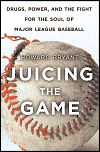September 14, 2005
On The Bookshelf
Just about all I've been doing in the past couple months is reading books, and here's a roundup of a few of them:

“Killing Yourself to Live,” by Chuck Klosterman. Klosterman’s new book, the follow-up to 2003’s “Sex, Drugs, and Cocoa Puffs,” uses the hook of the author road-tripping around the country to visit the sites of various rock-star deaths. But that’s merely a clothesline on which he hangs stories about his love life, as well as numerous theories about pop music- the best of which is his belief that Radiohead’s “Kid A” album predicted the September 11 attacks a year before the fact. A smart and entertaining book that’s sure to delight anyone who loves useless knowledge.

“Everything Bad is Good For You,” by Steven Johnson. Johnson’s polemic takes a counterintuitive position that I’ve long held myself- that popular culture, rather than being “sick,” is actually both better than ever before, and actually makes you smarter. How he gets there, however, is less than convincing- the analysis is a bit too academic for my tastes, and there’s way too much focus on videogames. And besides- the premise could easily have been successfully argued in 40 pages, and Johnson uses 200.

“Juicing the Game,” by Howard Bryant. Probably the best and most important baseball book since “Moneyball,” Bryant’s book covers the development and consequences of the steroid problem in the majors. But the book also looks at the past 15 years of baseball from other angles, with long sections on the 1994 strike and the 1998 home run chase. A lot of it is stories every baseball fan already knows, but Bryant brings a fresh perspective, and tells all of the stories very well.

“Blockbuster: How Hollywood Learned to Stop Worrying and Love the Summer,” by Tom Shone. Purportedly a “rebuttal” of Peter Biskind’s 1999 film-of-the-‘70s classic “Easy Riders, Raging Bulls,” Shone’s book traces the “blockbuster” era in Hollywood, measured roughly as the introduction of “Jaws” and “Star Wars” in the mid-‘70s up until the present day. “Blockbuster” shares one strength with Biskind’s book- it tells fascinating in-depth stories about the making of individual movies- but it’s a mystery why some 1990s blockbusters are dealt with in passing while others get their own chapter. In addition, it’s sometimes hard to grasp what argument Shone is making- that blockbuster movies are by their very nature good? That Biskind is wrong that the films of the ‘70s are better than those of subsequent decades? In all, Shone’s book is entertaining, if somewhat incoherent.

“Bringing Down the House” by Ben Mezrich. Just about everyone I know has read this book, so I figured I should too- and I’m glad I did. A fascinating story about a group of MIT undergraduates who used a card-counting scheme to win millions from casinos in Vegas and elsewhere. A taut and engaging thriller sure to be enjoyed by any gambling, Vegas, or math fan, it’s a surprise it hasn’t made it to the big screen- probably because (one) the title is already taken by the mediocre Steve Martin/Queen Latifah comedy, and (two) Hollywood hasn’t established enough young Asian males to fill a whole cast- I’m guessing they’ll use the whole lineup of “Better Luck Tomorrow,” along with Harold and Kumar. (UPDATE: a movie version, called “21,” is indeed planned for 2007).

“Black Mass” by Dick Lehr and Gerard O'Neill. This is the fascinating and often infuriating story of Boston mobster Whitey Bulger and his long-running, corrupt association with the Beantown office of the FBI. Bulger began acting as an informer for the Feds in 1975, and over the next 20 years worked to put the city’s Italian mob out of business- while the FBI looked the other way when Bulger committed countless crimes, including numerous murders. This is true-crime reporting at its finest, by two capable Boston Globe reporters.
Posted by Stephen Silver at September 14, 2005 08:38 PMI love it when other people tell me what to read. I always struggle in choosing a new book to read.
Explains how I end up reading some pretty stupid books
Posted by: Jeff S at September 17, 2005 06:32 PM